Finance 19 Report: Assessing the Role and Importance of Internal Audit
VerifiedAdded on 2022/08/18
|22
|6073
|14
Report
AI Summary
This report delves into the critical role and importance of internal audit within organizations, particularly in the context of finance. It begins by outlining the rationale for internal audits, emphasizing the need for risk management and corporate governance in today's dynamic business environment. The report then establishes research objectives and questions, followed by an exploration of relevant literature and theoretical frameworks, including agency theory, stakeholder theory, and contingency theory. A significant portion of the report is dedicated to defining internal audit, its objectives, and the benefits it brings to an organization. The report also examines the mechanisms of internal audit and discusses its role in improving organizational operations, ensuring financial performance, and assisting management in decision-making. Finally, the report concludes with recommendations for future research, reinforcing the significance of internal audit in maintaining financial integrity and organizational success. This paper is designed to provide insights on the role and importance of an organization's internal audit. The report covers objectives and benefits of internal audit in organizations.
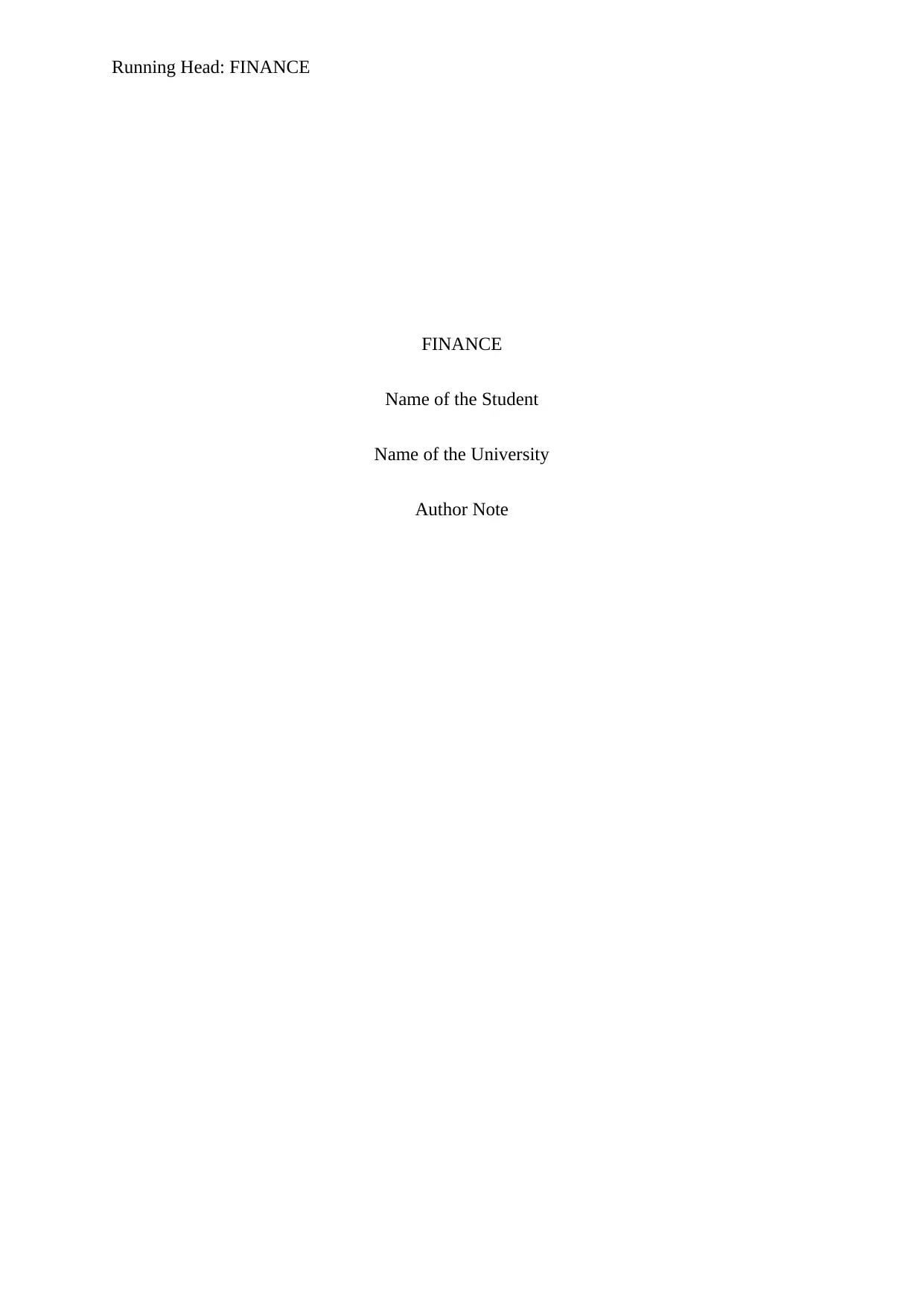
Running Head: FINANCE
FINANCE
Name of the Student
Name of the University
Author Note
FINANCE
Name of the Student
Name of the University
Author Note
Paraphrase This Document
Need a fresh take? Get an instant paraphrase of this document with our AI Paraphraser
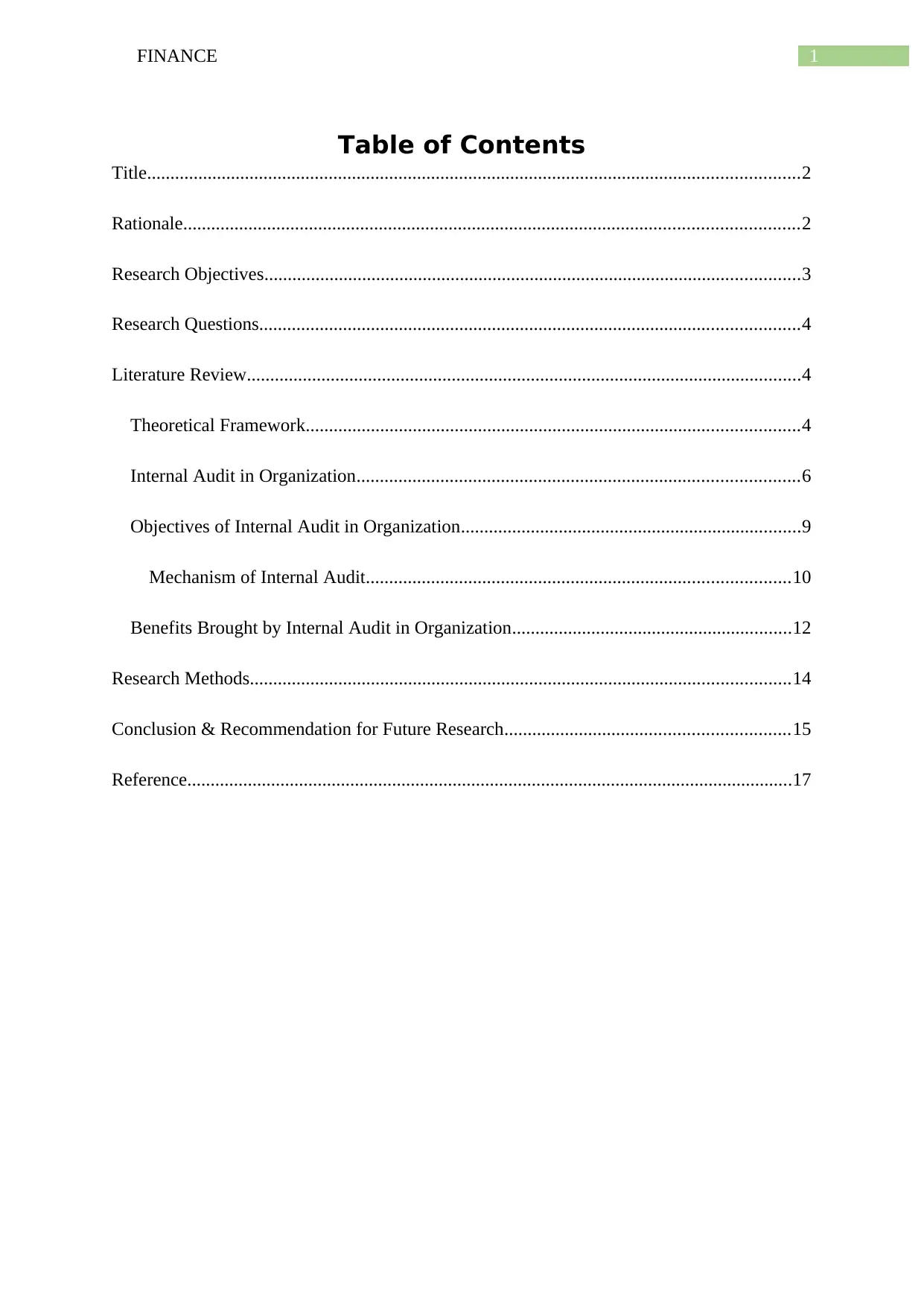
1FINANCE
Table of Contents
Title............................................................................................................................................2
Rationale....................................................................................................................................2
Research Objectives...................................................................................................................3
Research Questions....................................................................................................................4
Literature Review.......................................................................................................................4
Theoretical Framework..........................................................................................................4
Internal Audit in Organization...............................................................................................6
Objectives of Internal Audit in Organization.........................................................................9
Mechanism of Internal Audit...........................................................................................10
Benefits Brought by Internal Audit in Organization............................................................12
Research Methods....................................................................................................................14
Conclusion & Recommendation for Future Research.............................................................15
Reference..................................................................................................................................17
Table of Contents
Title............................................................................................................................................2
Rationale....................................................................................................................................2
Research Objectives...................................................................................................................3
Research Questions....................................................................................................................4
Literature Review.......................................................................................................................4
Theoretical Framework..........................................................................................................4
Internal Audit in Organization...............................................................................................6
Objectives of Internal Audit in Organization.........................................................................9
Mechanism of Internal Audit...........................................................................................10
Benefits Brought by Internal Audit in Organization............................................................12
Research Methods....................................................................................................................14
Conclusion & Recommendation for Future Research.............................................................15
Reference..................................................................................................................................17
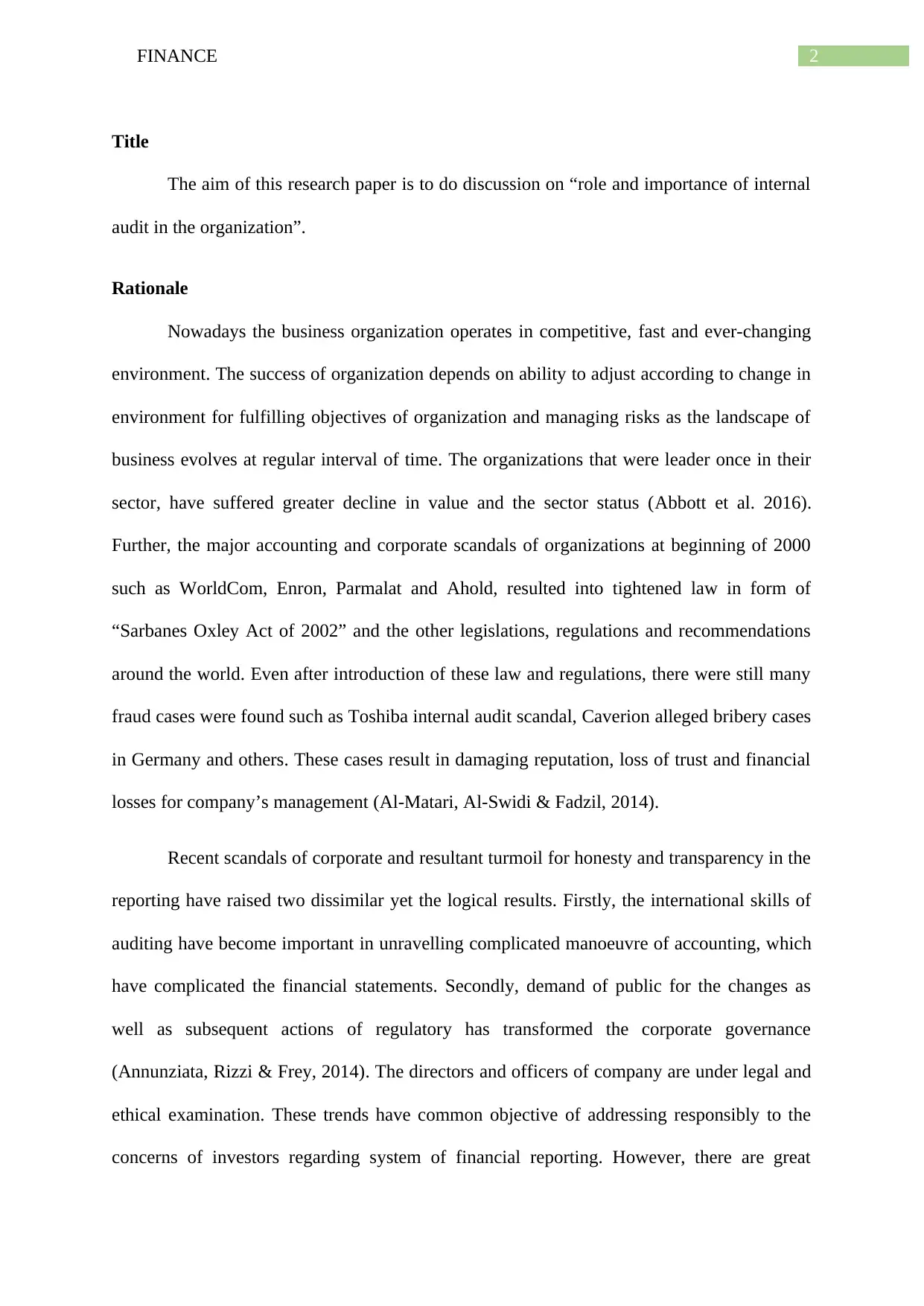
2FINANCE
Title
The aim of this research paper is to do discussion on “role and importance of internal
audit in the organization”.
Rationale
Nowadays the business organization operates in competitive, fast and ever-changing
environment. The success of organization depends on ability to adjust according to change in
environment for fulfilling objectives of organization and managing risks as the landscape of
business evolves at regular interval of time. The organizations that were leader once in their
sector, have suffered greater decline in value and the sector status (Abbott et al. 2016).
Further, the major accounting and corporate scandals of organizations at beginning of 2000
such as WorldCom, Enron, Parmalat and Ahold, resulted into tightened law in form of
“Sarbanes Oxley Act of 2002” and the other legislations, regulations and recommendations
around the world. Even after introduction of these law and regulations, there were still many
fraud cases were found such as Toshiba internal audit scandal, Caverion alleged bribery cases
in Germany and others. These cases result in damaging reputation, loss of trust and financial
losses for company’s management (Al-Matari, Al-Swidi & Fadzil, 2014).
Recent scandals of corporate and resultant turmoil for honesty and transparency in the
reporting have raised two dissimilar yet the logical results. Firstly, the international skills of
auditing have become important in unravelling complicated manoeuvre of accounting, which
have complicated the financial statements. Secondly, demand of public for the changes as
well as subsequent actions of regulatory has transformed the corporate governance
(Annunziata, Rizzi & Frey, 2014). The directors and officers of company are under legal and
ethical examination. These trends have common objective of addressing responsibly to the
concerns of investors regarding system of financial reporting. However, there are great
Title
The aim of this research paper is to do discussion on “role and importance of internal
audit in the organization”.
Rationale
Nowadays the business organization operates in competitive, fast and ever-changing
environment. The success of organization depends on ability to adjust according to change in
environment for fulfilling objectives of organization and managing risks as the landscape of
business evolves at regular interval of time. The organizations that were leader once in their
sector, have suffered greater decline in value and the sector status (Abbott et al. 2016).
Further, the major accounting and corporate scandals of organizations at beginning of 2000
such as WorldCom, Enron, Parmalat and Ahold, resulted into tightened law in form of
“Sarbanes Oxley Act of 2002” and the other legislations, regulations and recommendations
around the world. Even after introduction of these law and regulations, there were still many
fraud cases were found such as Toshiba internal audit scandal, Caverion alleged bribery cases
in Germany and others. These cases result in damaging reputation, loss of trust and financial
losses for company’s management (Al-Matari, Al-Swidi & Fadzil, 2014).
Recent scandals of corporate and resultant turmoil for honesty and transparency in the
reporting have raised two dissimilar yet the logical results. Firstly, the international skills of
auditing have become important in unravelling complicated manoeuvre of accounting, which
have complicated the financial statements. Secondly, demand of public for the changes as
well as subsequent actions of regulatory has transformed the corporate governance
(Annunziata, Rizzi & Frey, 2014). The directors and officers of company are under legal and
ethical examination. These trends have common objective of addressing responsibly to the
concerns of investors regarding system of financial reporting. However, there are great
⊘ This is a preview!⊘
Do you want full access?
Subscribe today to unlock all pages.

Trusted by 1+ million students worldwide
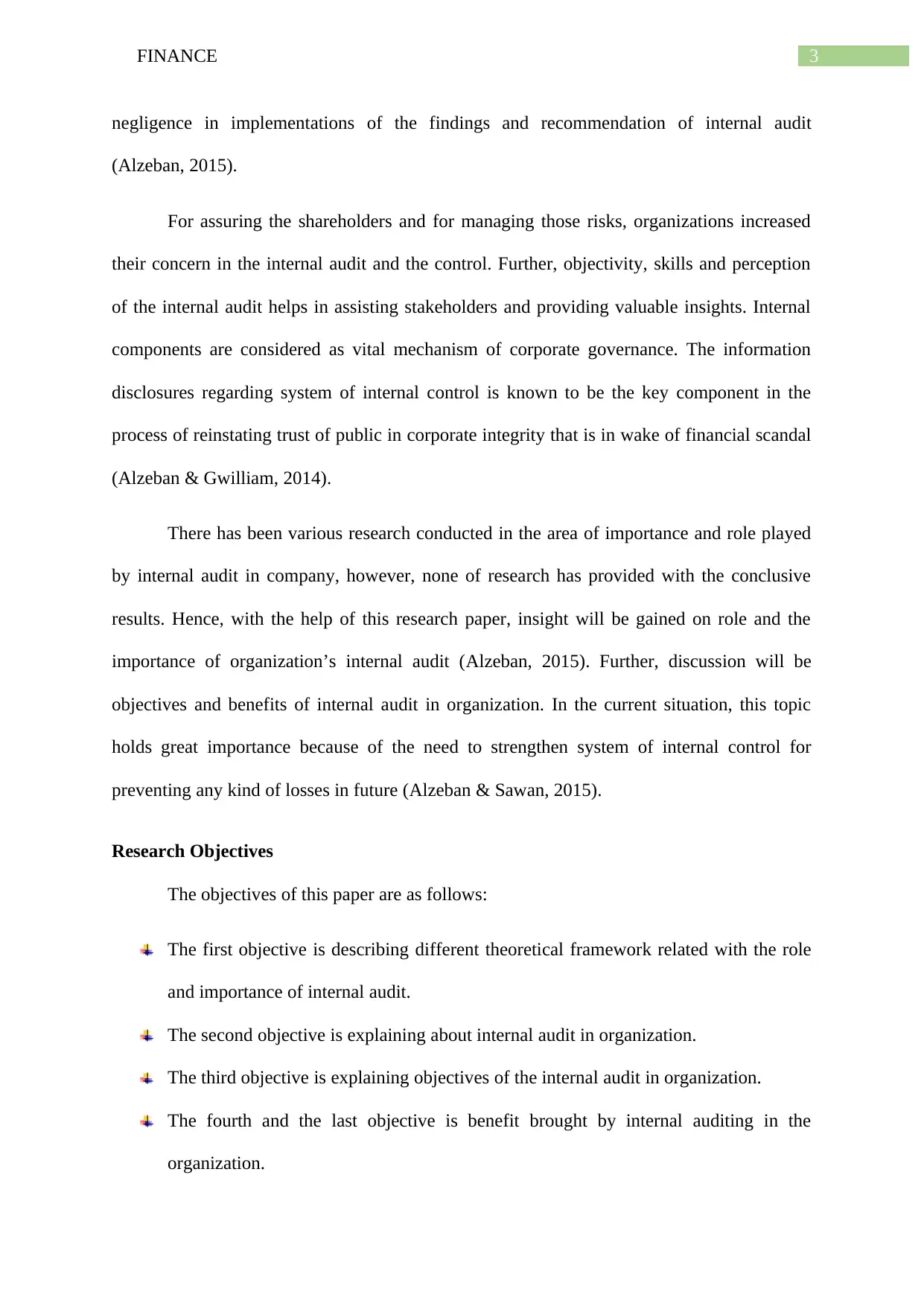
3FINANCE
negligence in implementations of the findings and recommendation of internal audit
(Alzeban, 2015).
For assuring the shareholders and for managing those risks, organizations increased
their concern in the internal audit and the control. Further, objectivity, skills and perception
of the internal audit helps in assisting stakeholders and providing valuable insights. Internal
components are considered as vital mechanism of corporate governance. The information
disclosures regarding system of internal control is known to be the key component in the
process of reinstating trust of public in corporate integrity that is in wake of financial scandal
(Alzeban & Gwilliam, 2014).
There has been various research conducted in the area of importance and role played
by internal audit in company, however, none of research has provided with the conclusive
results. Hence, with the help of this research paper, insight will be gained on role and the
importance of organization’s internal audit (Alzeban, 2015). Further, discussion will be
objectives and benefits of internal audit in organization. In the current situation, this topic
holds great importance because of the need to strengthen system of internal control for
preventing any kind of losses in future (Alzeban & Sawan, 2015).
Research Objectives
The objectives of this paper are as follows:
The first objective is describing different theoretical framework related with the role
and importance of internal audit.
The second objective is explaining about internal audit in organization.
The third objective is explaining objectives of the internal audit in organization.
The fourth and the last objective is benefit brought by internal auditing in the
organization.
negligence in implementations of the findings and recommendation of internal audit
(Alzeban, 2015).
For assuring the shareholders and for managing those risks, organizations increased
their concern in the internal audit and the control. Further, objectivity, skills and perception
of the internal audit helps in assisting stakeholders and providing valuable insights. Internal
components are considered as vital mechanism of corporate governance. The information
disclosures regarding system of internal control is known to be the key component in the
process of reinstating trust of public in corporate integrity that is in wake of financial scandal
(Alzeban & Gwilliam, 2014).
There has been various research conducted in the area of importance and role played
by internal audit in company, however, none of research has provided with the conclusive
results. Hence, with the help of this research paper, insight will be gained on role and the
importance of organization’s internal audit (Alzeban, 2015). Further, discussion will be
objectives and benefits of internal audit in organization. In the current situation, this topic
holds great importance because of the need to strengthen system of internal control for
preventing any kind of losses in future (Alzeban & Sawan, 2015).
Research Objectives
The objectives of this paper are as follows:
The first objective is describing different theoretical framework related with the role
and importance of internal audit.
The second objective is explaining about internal audit in organization.
The third objective is explaining objectives of the internal audit in organization.
The fourth and the last objective is benefit brought by internal auditing in the
organization.
Paraphrase This Document
Need a fresh take? Get an instant paraphrase of this document with our AI Paraphraser
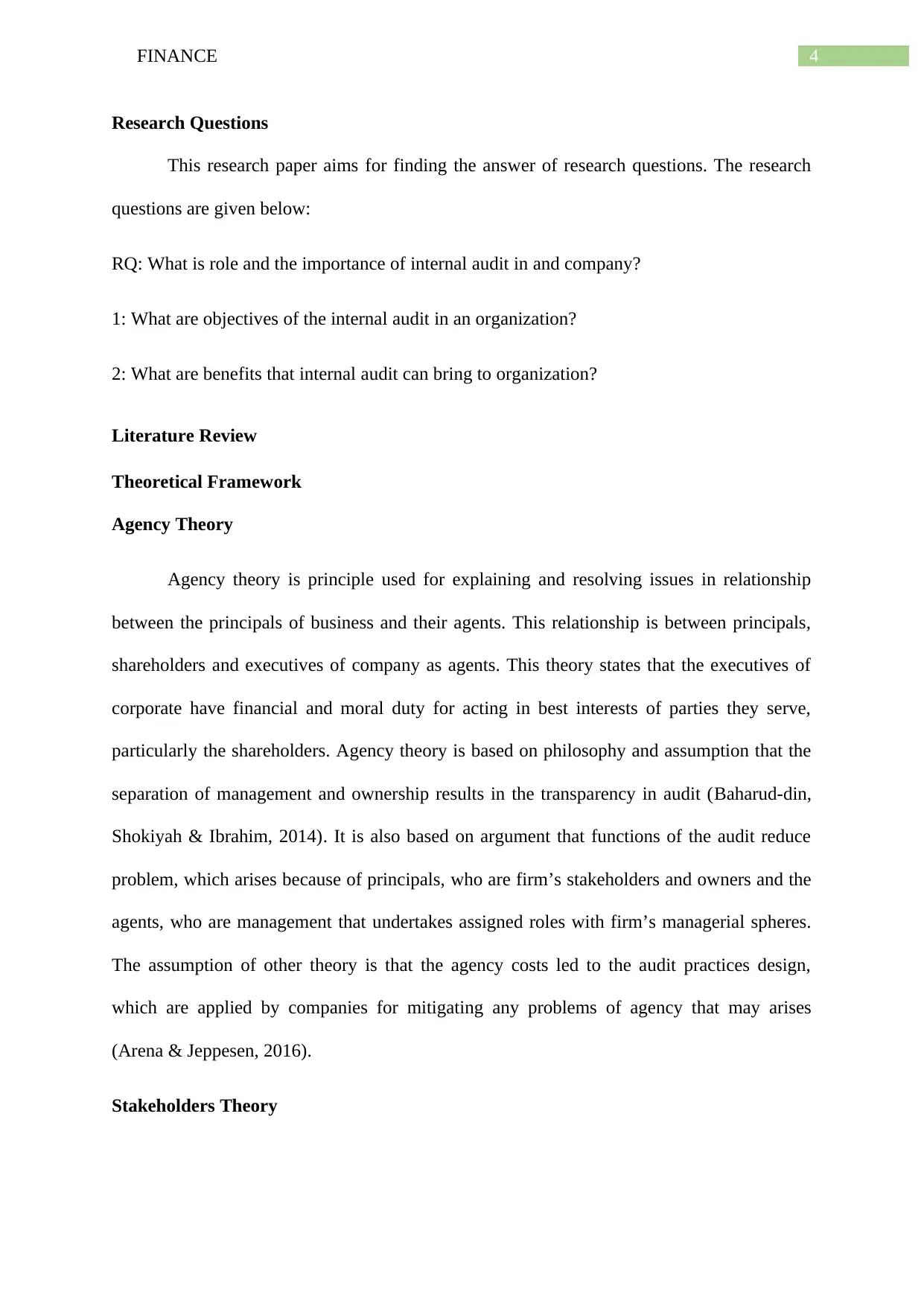
4FINANCE
Research Questions
This research paper aims for finding the answer of research questions. The research
questions are given below:
RQ: What is role and the importance of internal audit in and company?
1: What are objectives of the internal audit in an organization?
2: What are benefits that internal audit can bring to organization?
Literature Review
Theoretical Framework
Agency Theory
Agency theory is principle used for explaining and resolving issues in relationship
between the principals of business and their agents. This relationship is between principals,
shareholders and executives of company as agents. This theory states that the executives of
corporate have financial and moral duty for acting in best interests of parties they serve,
particularly the shareholders. Agency theory is based on philosophy and assumption that the
separation of management and ownership results in the transparency in audit (Baharud-din,
Shokiyah & Ibrahim, 2014). It is also based on argument that functions of the audit reduce
problem, which arises because of principals, who are firm’s stakeholders and owners and the
agents, who are management that undertakes assigned roles with firm’s managerial spheres.
The assumption of other theory is that the agency costs led to the audit practices design,
which are applied by companies for mitigating any problems of agency that may arises
(Arena & Jeppesen, 2016).
Stakeholders Theory
Research Questions
This research paper aims for finding the answer of research questions. The research
questions are given below:
RQ: What is role and the importance of internal audit in and company?
1: What are objectives of the internal audit in an organization?
2: What are benefits that internal audit can bring to organization?
Literature Review
Theoretical Framework
Agency Theory
Agency theory is principle used for explaining and resolving issues in relationship
between the principals of business and their agents. This relationship is between principals,
shareholders and executives of company as agents. This theory states that the executives of
corporate have financial and moral duty for acting in best interests of parties they serve,
particularly the shareholders. Agency theory is based on philosophy and assumption that the
separation of management and ownership results in the transparency in audit (Baharud-din,
Shokiyah & Ibrahim, 2014). It is also based on argument that functions of the audit reduce
problem, which arises because of principals, who are firm’s stakeholders and owners and the
agents, who are management that undertakes assigned roles with firm’s managerial spheres.
The assumption of other theory is that the agency costs led to the audit practices design,
which are applied by companies for mitigating any problems of agency that may arises
(Arena & Jeppesen, 2016).
Stakeholders Theory
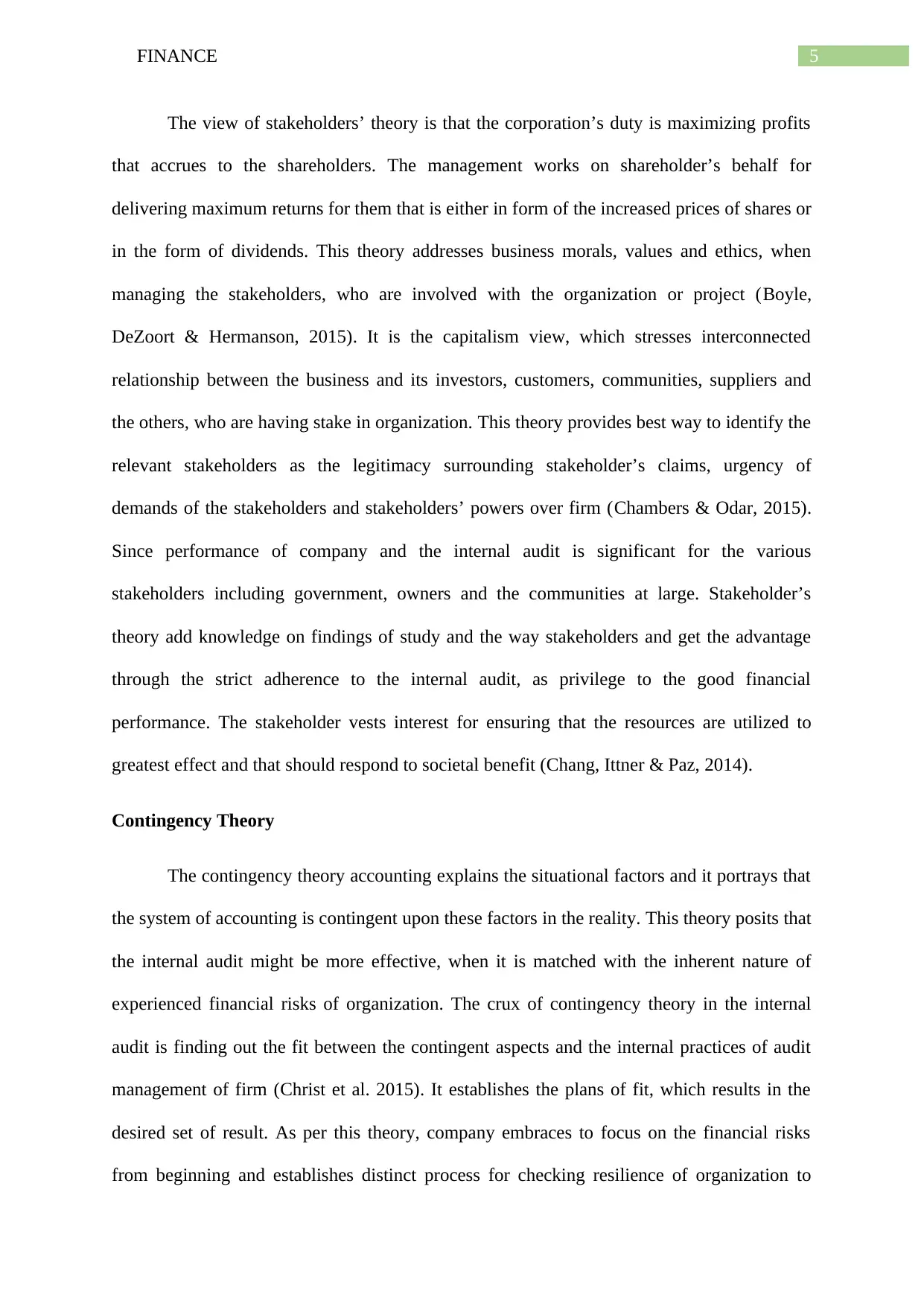
5FINANCE
The view of stakeholders’ theory is that the corporation’s duty is maximizing profits
that accrues to the shareholders. The management works on shareholder’s behalf for
delivering maximum returns for them that is either in form of the increased prices of shares or
in the form of dividends. This theory addresses business morals, values and ethics, when
managing the stakeholders, who are involved with the organization or project (Boyle,
DeZoort & Hermanson, 2015). It is the capitalism view, which stresses interconnected
relationship between the business and its investors, customers, communities, suppliers and
the others, who are having stake in organization. This theory provides best way to identify the
relevant stakeholders as the legitimacy surrounding stakeholder’s claims, urgency of
demands of the stakeholders and stakeholders’ powers over firm (Chambers & Odar, 2015).
Since performance of company and the internal audit is significant for the various
stakeholders including government, owners and the communities at large. Stakeholder’s
theory add knowledge on findings of study and the way stakeholders and get the advantage
through the strict adherence to the internal audit, as privilege to the good financial
performance. The stakeholder vests interest for ensuring that the resources are utilized to
greatest effect and that should respond to societal benefit (Chang, Ittner & Paz, 2014).
Contingency Theory
The contingency theory accounting explains the situational factors and it portrays that
the system of accounting is contingent upon these factors in the reality. This theory posits that
the internal audit might be more effective, when it is matched with the inherent nature of
experienced financial risks of organization. The crux of contingency theory in the internal
audit is finding out the fit between the contingent aspects and the internal practices of audit
management of firm (Christ et al. 2015). It establishes the plans of fit, which results in the
desired set of result. As per this theory, company embraces to focus on the financial risks
from beginning and establishes distinct process for checking resilience of organization to
The view of stakeholders’ theory is that the corporation’s duty is maximizing profits
that accrues to the shareholders. The management works on shareholder’s behalf for
delivering maximum returns for them that is either in form of the increased prices of shares or
in the form of dividends. This theory addresses business morals, values and ethics, when
managing the stakeholders, who are involved with the organization or project (Boyle,
DeZoort & Hermanson, 2015). It is the capitalism view, which stresses interconnected
relationship between the business and its investors, customers, communities, suppliers and
the others, who are having stake in organization. This theory provides best way to identify the
relevant stakeholders as the legitimacy surrounding stakeholder’s claims, urgency of
demands of the stakeholders and stakeholders’ powers over firm (Chambers & Odar, 2015).
Since performance of company and the internal audit is significant for the various
stakeholders including government, owners and the communities at large. Stakeholder’s
theory add knowledge on findings of study and the way stakeholders and get the advantage
through the strict adherence to the internal audit, as privilege to the good financial
performance. The stakeholder vests interest for ensuring that the resources are utilized to
greatest effect and that should respond to societal benefit (Chang, Ittner & Paz, 2014).
Contingency Theory
The contingency theory accounting explains the situational factors and it portrays that
the system of accounting is contingent upon these factors in the reality. This theory posits that
the internal audit might be more effective, when it is matched with the inherent nature of
experienced financial risks of organization. The crux of contingency theory in the internal
audit is finding out the fit between the contingent aspects and the internal practices of audit
management of firm (Christ et al. 2015). It establishes the plans of fit, which results in the
desired set of result. As per this theory, company embraces to focus on the financial risks
from beginning and establishes distinct process for checking resilience of organization to
⊘ This is a preview!⊘
Do you want full access?
Subscribe today to unlock all pages.

Trusted by 1+ million students worldwide
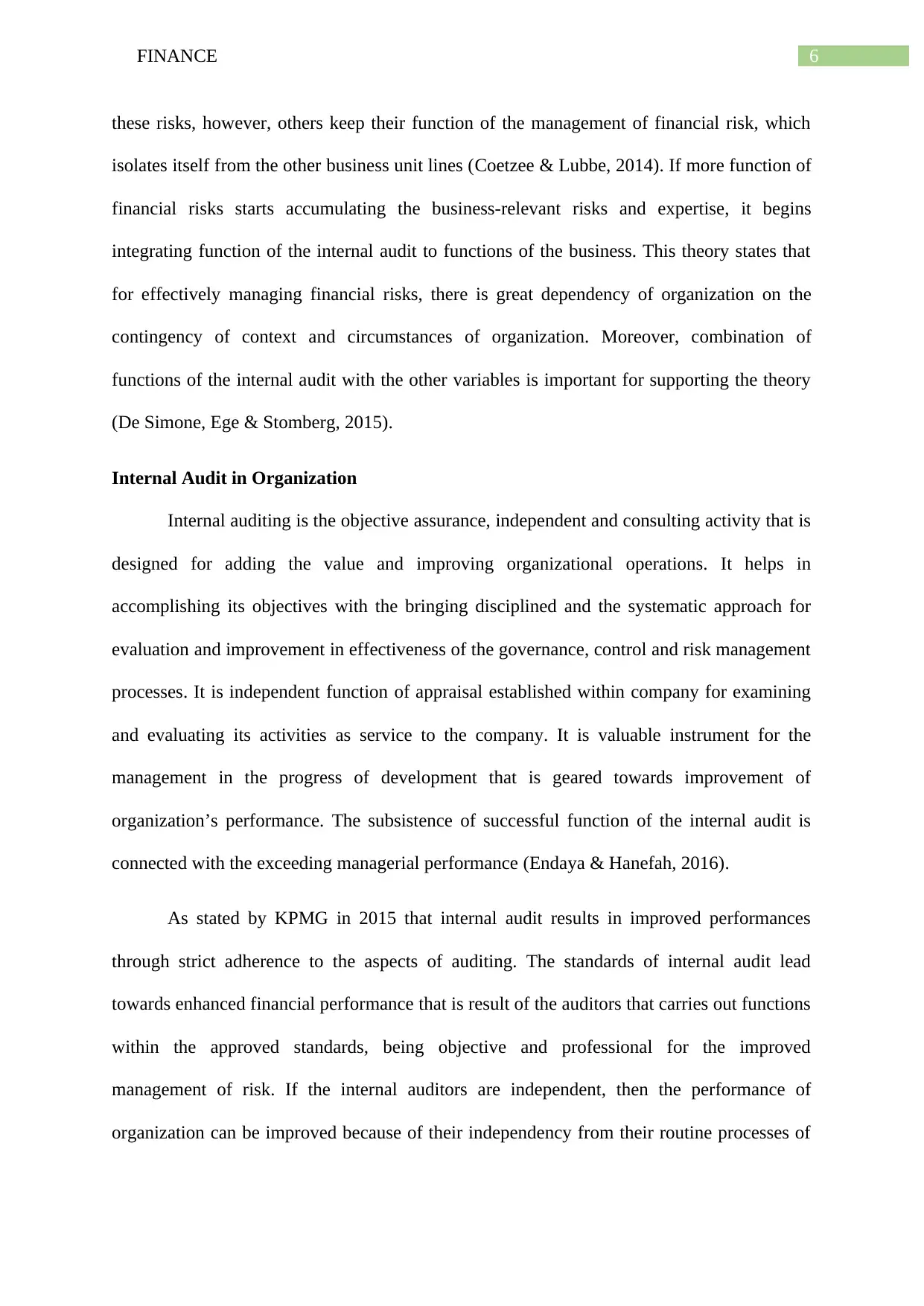
6FINANCE
these risks, however, others keep their function of the management of financial risk, which
isolates itself from the other business unit lines (Coetzee & Lubbe, 2014). If more function of
financial risks starts accumulating the business-relevant risks and expertise, it begins
integrating function of the internal audit to functions of the business. This theory states that
for effectively managing financial risks, there is great dependency of organization on the
contingency of context and circumstances of organization. Moreover, combination of
functions of the internal audit with the other variables is important for supporting the theory
(De Simone, Ege & Stomberg, 2015).
Internal Audit in Organization
Internal auditing is the objective assurance, independent and consulting activity that is
designed for adding the value and improving organizational operations. It helps in
accomplishing its objectives with the bringing disciplined and the systematic approach for
evaluation and improvement in effectiveness of the governance, control and risk management
processes. It is independent function of appraisal established within company for examining
and evaluating its activities as service to the company. It is valuable instrument for the
management in the progress of development that is geared towards improvement of
organization’s performance. The subsistence of successful function of the internal audit is
connected with the exceeding managerial performance (Endaya & Hanefah, 2016).
As stated by KPMG in 2015 that internal audit results in improved performances
through strict adherence to the aspects of auditing. The standards of internal audit lead
towards enhanced financial performance that is result of the auditors that carries out functions
within the approved standards, being objective and professional for the improved
management of risk. If the internal auditors are independent, then the performance of
organization can be improved because of their independency from their routine processes of
these risks, however, others keep their function of the management of financial risk, which
isolates itself from the other business unit lines (Coetzee & Lubbe, 2014). If more function of
financial risks starts accumulating the business-relevant risks and expertise, it begins
integrating function of the internal audit to functions of the business. This theory states that
for effectively managing financial risks, there is great dependency of organization on the
contingency of context and circumstances of organization. Moreover, combination of
functions of the internal audit with the other variables is important for supporting the theory
(De Simone, Ege & Stomberg, 2015).
Internal Audit in Organization
Internal auditing is the objective assurance, independent and consulting activity that is
designed for adding the value and improving organizational operations. It helps in
accomplishing its objectives with the bringing disciplined and the systematic approach for
evaluation and improvement in effectiveness of the governance, control and risk management
processes. It is independent function of appraisal established within company for examining
and evaluating its activities as service to the company. It is valuable instrument for the
management in the progress of development that is geared towards improvement of
organization’s performance. The subsistence of successful function of the internal audit is
connected with the exceeding managerial performance (Endaya & Hanefah, 2016).
As stated by KPMG in 2015 that internal audit results in improved performances
through strict adherence to the aspects of auditing. The standards of internal audit lead
towards enhanced financial performance that is result of the auditors that carries out functions
within the approved standards, being objective and professional for the improved
management of risk. If the internal auditors are independent, then the performance of
organization can be improved because of their independency from their routine processes of
Paraphrase This Document
Need a fresh take? Get an instant paraphrase of this document with our AI Paraphraser
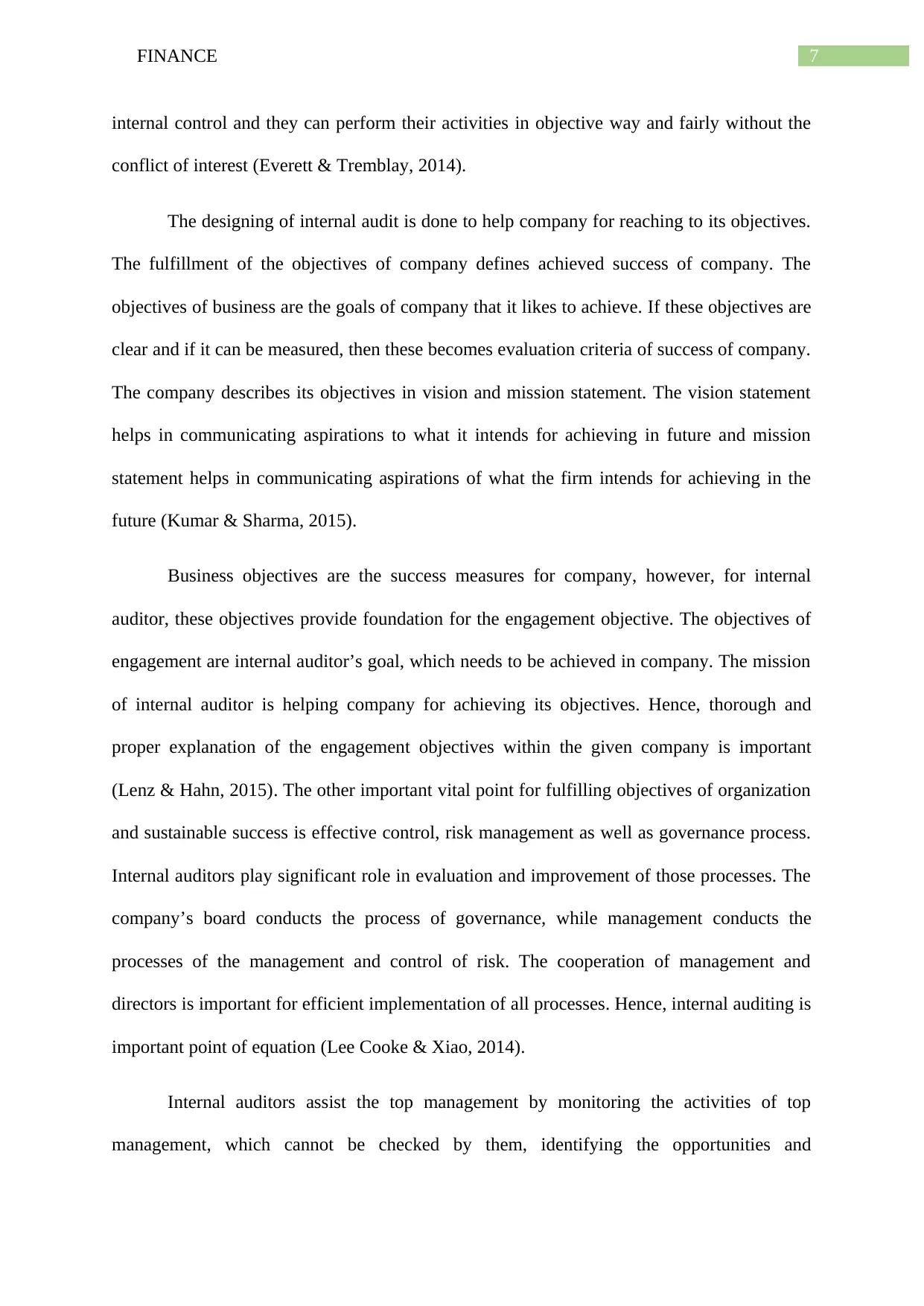
7FINANCE
internal control and they can perform their activities in objective way and fairly without the
conflict of interest (Everett & Tremblay, 2014).
The designing of internal audit is done to help company for reaching to its objectives.
The fulfillment of the objectives of company defines achieved success of company. The
objectives of business are the goals of company that it likes to achieve. If these objectives are
clear and if it can be measured, then these becomes evaluation criteria of success of company.
The company describes its objectives in vision and mission statement. The vision statement
helps in communicating aspirations to what it intends for achieving in future and mission
statement helps in communicating aspirations of what the firm intends for achieving in the
future (Kumar & Sharma, 2015).
Business objectives are the success measures for company, however, for internal
auditor, these objectives provide foundation for the engagement objective. The objectives of
engagement are internal auditor’s goal, which needs to be achieved in company. The mission
of internal auditor is helping company for achieving its objectives. Hence, thorough and
proper explanation of the engagement objectives within the given company is important
(Lenz & Hahn, 2015). The other important vital point for fulfilling objectives of organization
and sustainable success is effective control, risk management as well as governance process.
Internal auditors play significant role in evaluation and improvement of those processes. The
company’s board conducts the process of governance, while management conducts the
processes of the management and control of risk. The cooperation of management and
directors is important for efficient implementation of all processes. Hence, internal auditing is
important point of equation (Lee Cooke & Xiao, 2014).
Internal auditors assist the top management by monitoring the activities of top
management, which cannot be checked by them, identifying the opportunities and
internal control and they can perform their activities in objective way and fairly without the
conflict of interest (Everett & Tremblay, 2014).
The designing of internal audit is done to help company for reaching to its objectives.
The fulfillment of the objectives of company defines achieved success of company. The
objectives of business are the goals of company that it likes to achieve. If these objectives are
clear and if it can be measured, then these becomes evaluation criteria of success of company.
The company describes its objectives in vision and mission statement. The vision statement
helps in communicating aspirations to what it intends for achieving in future and mission
statement helps in communicating aspirations of what the firm intends for achieving in the
future (Kumar & Sharma, 2015).
Business objectives are the success measures for company, however, for internal
auditor, these objectives provide foundation for the engagement objective. The objectives of
engagement are internal auditor’s goal, which needs to be achieved in company. The mission
of internal auditor is helping company for achieving its objectives. Hence, thorough and
proper explanation of the engagement objectives within the given company is important
(Lenz & Hahn, 2015). The other important vital point for fulfilling objectives of organization
and sustainable success is effective control, risk management as well as governance process.
Internal auditors play significant role in evaluation and improvement of those processes. The
company’s board conducts the process of governance, while management conducts the
processes of the management and control of risk. The cooperation of management and
directors is important for efficient implementation of all processes. Hence, internal auditing is
important point of equation (Lee Cooke & Xiao, 2014).
Internal auditors assist the top management by monitoring the activities of top
management, which cannot be checked by them, identifying the opportunities and
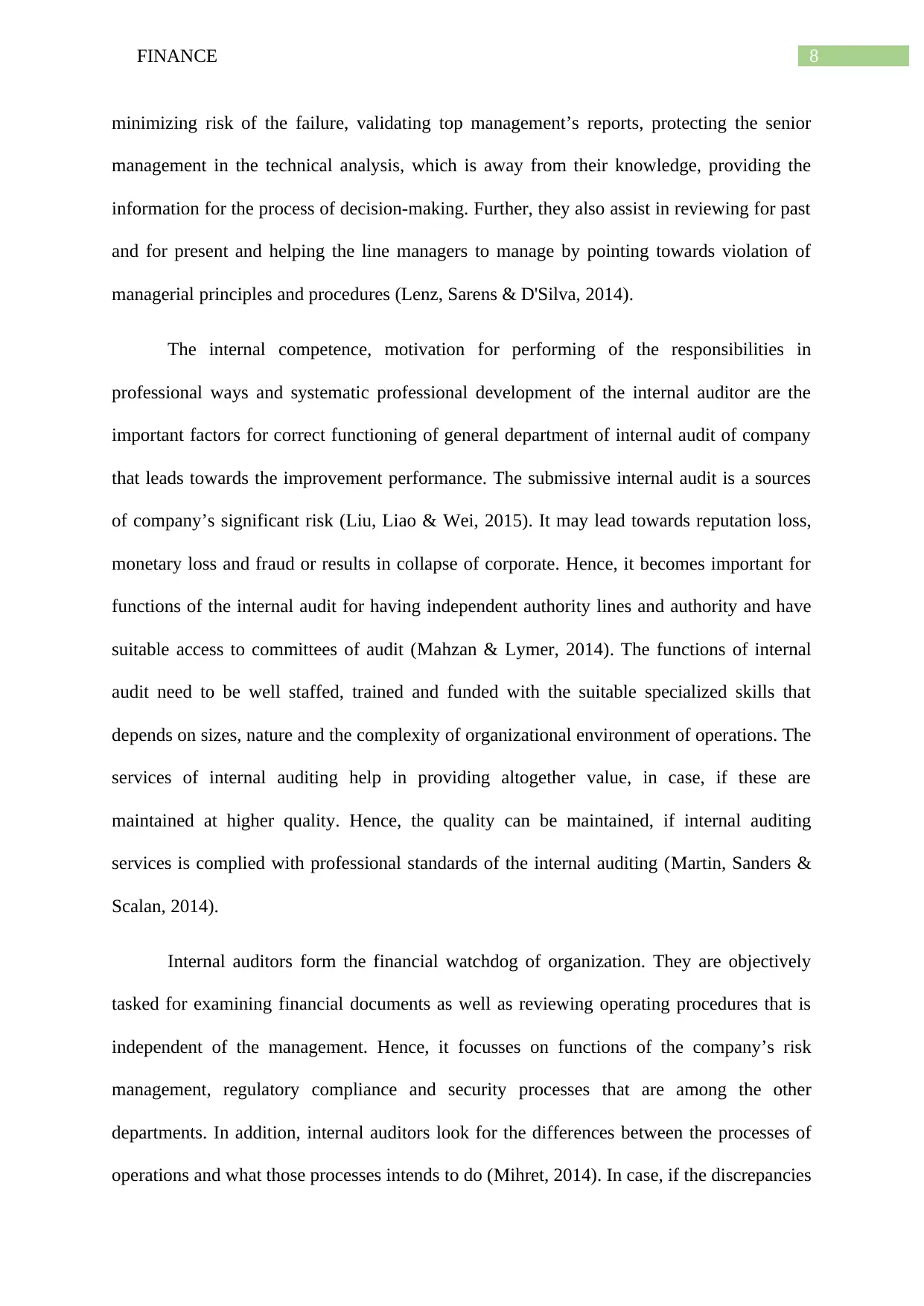
8FINANCE
minimizing risk of the failure, validating top management’s reports, protecting the senior
management in the technical analysis, which is away from their knowledge, providing the
information for the process of decision-making. Further, they also assist in reviewing for past
and for present and helping the line managers to manage by pointing towards violation of
managerial principles and procedures (Lenz, Sarens & D'Silva, 2014).
The internal competence, motivation for performing of the responsibilities in
professional ways and systematic professional development of the internal auditor are the
important factors for correct functioning of general department of internal audit of company
that leads towards the improvement performance. The submissive internal audit is a sources
of company’s significant risk (Liu, Liao & Wei, 2015). It may lead towards reputation loss,
monetary loss and fraud or results in collapse of corporate. Hence, it becomes important for
functions of the internal audit for having independent authority lines and authority and have
suitable access to committees of audit (Mahzan & Lymer, 2014). The functions of internal
audit need to be well staffed, trained and funded with the suitable specialized skills that
depends on sizes, nature and the complexity of organizational environment of operations. The
services of internal auditing help in providing altogether value, in case, if these are
maintained at higher quality. Hence, the quality can be maintained, if internal auditing
services is complied with professional standards of the internal auditing (Martin, Sanders &
Scalan, 2014).
Internal auditors form the financial watchdog of organization. They are objectively
tasked for examining financial documents as well as reviewing operating procedures that is
independent of the management. Hence, it focusses on functions of the company’s risk
management, regulatory compliance and security processes that are among the other
departments. In addition, internal auditors look for the differences between the processes of
operations and what those processes intends to do (Mihret, 2014). In case, if the discrepancies
minimizing risk of the failure, validating top management’s reports, protecting the senior
management in the technical analysis, which is away from their knowledge, providing the
information for the process of decision-making. Further, they also assist in reviewing for past
and for present and helping the line managers to manage by pointing towards violation of
managerial principles and procedures (Lenz, Sarens & D'Silva, 2014).
The internal competence, motivation for performing of the responsibilities in
professional ways and systematic professional development of the internal auditor are the
important factors for correct functioning of general department of internal audit of company
that leads towards the improvement performance. The submissive internal audit is a sources
of company’s significant risk (Liu, Liao & Wei, 2015). It may lead towards reputation loss,
monetary loss and fraud or results in collapse of corporate. Hence, it becomes important for
functions of the internal audit for having independent authority lines and authority and have
suitable access to committees of audit (Mahzan & Lymer, 2014). The functions of internal
audit need to be well staffed, trained and funded with the suitable specialized skills that
depends on sizes, nature and the complexity of organizational environment of operations. The
services of internal auditing help in providing altogether value, in case, if these are
maintained at higher quality. Hence, the quality can be maintained, if internal auditing
services is complied with professional standards of the internal auditing (Martin, Sanders &
Scalan, 2014).
Internal auditors form the financial watchdog of organization. They are objectively
tasked for examining financial documents as well as reviewing operating procedures that is
independent of the management. Hence, it focusses on functions of the company’s risk
management, regulatory compliance and security processes that are among the other
departments. In addition, internal auditors look for the differences between the processes of
operations and what those processes intends to do (Mihret, 2014). In case, if the discrepancies
⊘ This is a preview!⊘
Do you want full access?
Subscribe today to unlock all pages.

Trusted by 1+ million students worldwide
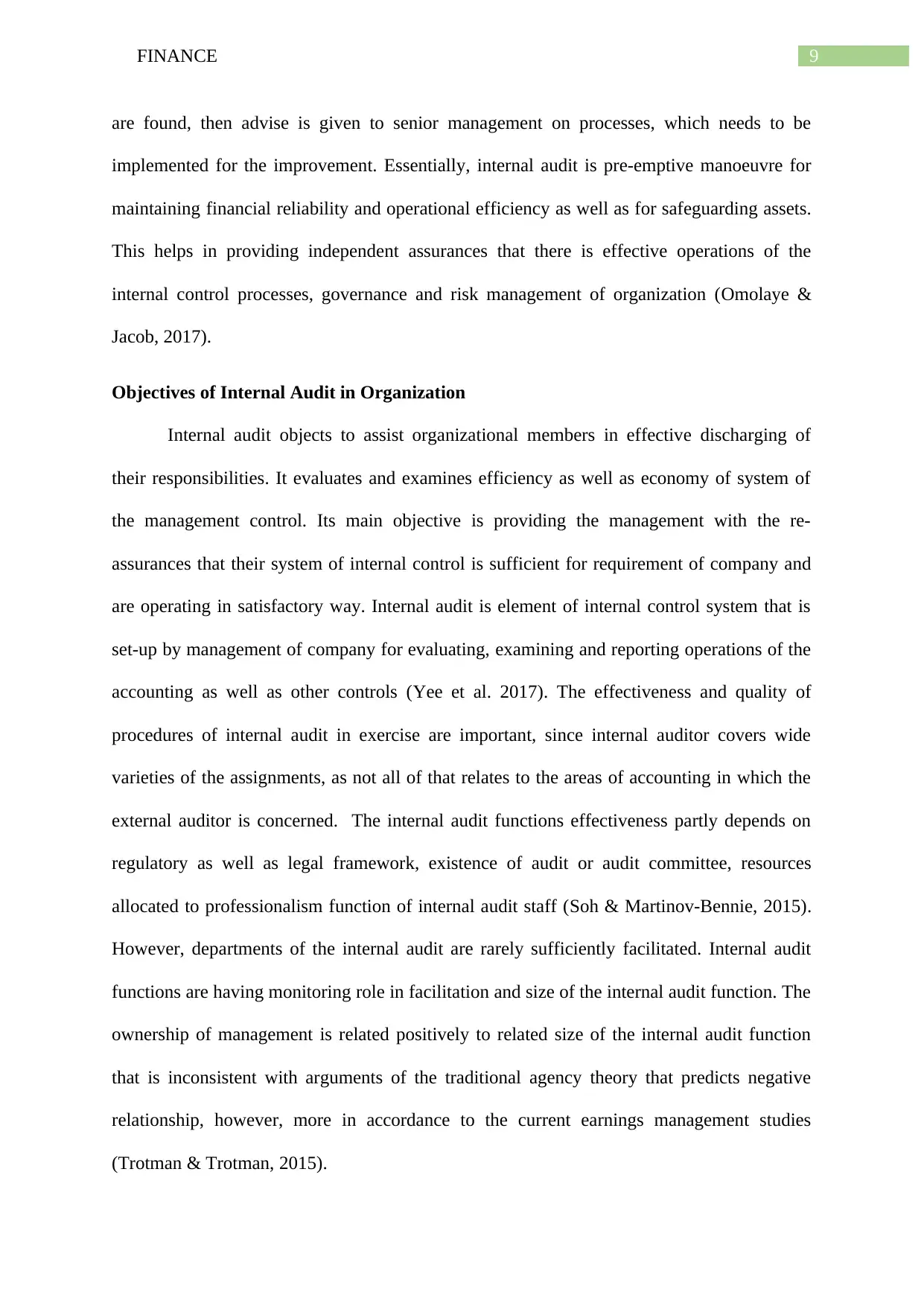
9FINANCE
are found, then advise is given to senior management on processes, which needs to be
implemented for the improvement. Essentially, internal audit is pre-emptive manoeuvre for
maintaining financial reliability and operational efficiency as well as for safeguarding assets.
This helps in providing independent assurances that there is effective operations of the
internal control processes, governance and risk management of organization (Omolaye &
Jacob, 2017).
Objectives of Internal Audit in Organization
Internal audit objects to assist organizational members in effective discharging of
their responsibilities. It evaluates and examines efficiency as well as economy of system of
the management control. Its main objective is providing the management with the re-
assurances that their system of internal control is sufficient for requirement of company and
are operating in satisfactory way. Internal audit is element of internal control system that is
set-up by management of company for evaluating, examining and reporting operations of the
accounting as well as other controls (Yee et al. 2017). The effectiveness and quality of
procedures of internal audit in exercise are important, since internal auditor covers wide
varieties of the assignments, as not all of that relates to the areas of accounting in which the
external auditor is concerned. The internal audit functions effectiveness partly depends on
regulatory as well as legal framework, existence of audit or audit committee, resources
allocated to professionalism function of internal audit staff (Soh & Martinov-Bennie, 2015).
However, departments of the internal audit are rarely sufficiently facilitated. Internal audit
functions are having monitoring role in facilitation and size of the internal audit function. The
ownership of management is related positively to related size of the internal audit function
that is inconsistent with arguments of the traditional agency theory that predicts negative
relationship, however, more in accordance to the current earnings management studies
(Trotman & Trotman, 2015).
are found, then advise is given to senior management on processes, which needs to be
implemented for the improvement. Essentially, internal audit is pre-emptive manoeuvre for
maintaining financial reliability and operational efficiency as well as for safeguarding assets.
This helps in providing independent assurances that there is effective operations of the
internal control processes, governance and risk management of organization (Omolaye &
Jacob, 2017).
Objectives of Internal Audit in Organization
Internal audit objects to assist organizational members in effective discharging of
their responsibilities. It evaluates and examines efficiency as well as economy of system of
the management control. Its main objective is providing the management with the re-
assurances that their system of internal control is sufficient for requirement of company and
are operating in satisfactory way. Internal audit is element of internal control system that is
set-up by management of company for evaluating, examining and reporting operations of the
accounting as well as other controls (Yee et al. 2017). The effectiveness and quality of
procedures of internal audit in exercise are important, since internal auditor covers wide
varieties of the assignments, as not all of that relates to the areas of accounting in which the
external auditor is concerned. The internal audit functions effectiveness partly depends on
regulatory as well as legal framework, existence of audit or audit committee, resources
allocated to professionalism function of internal audit staff (Soh & Martinov-Bennie, 2015).
However, departments of the internal audit are rarely sufficiently facilitated. Internal audit
functions are having monitoring role in facilitation and size of the internal audit function. The
ownership of management is related positively to related size of the internal audit function
that is inconsistent with arguments of the traditional agency theory that predicts negative
relationship, however, more in accordance to the current earnings management studies
(Trotman & Trotman, 2015).
Paraphrase This Document
Need a fresh take? Get an instant paraphrase of this document with our AI Paraphraser
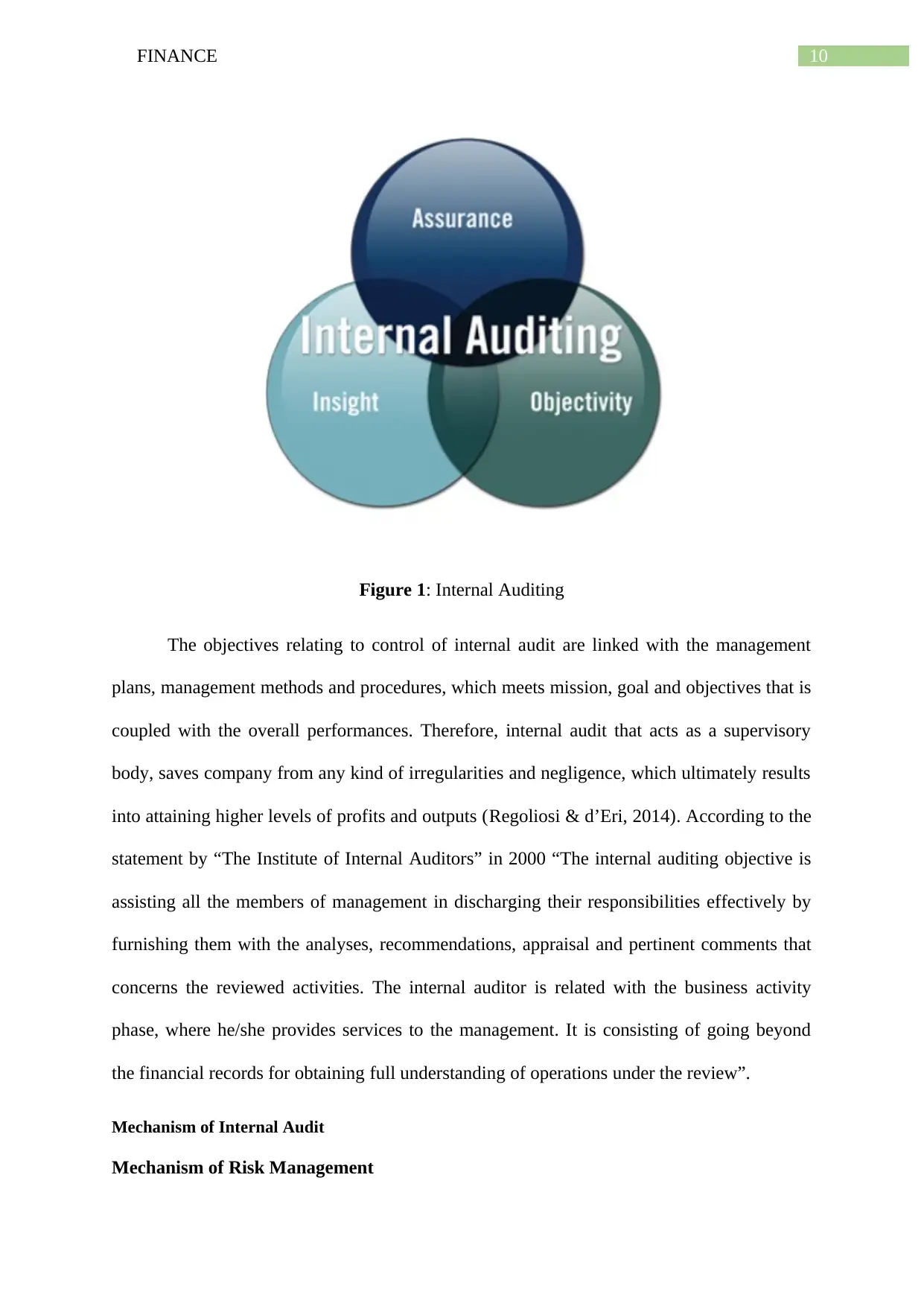
10FINANCE
Figure 1: Internal Auditing
The objectives relating to control of internal audit are linked with the management
plans, management methods and procedures, which meets mission, goal and objectives that is
coupled with the overall performances. Therefore, internal audit that acts as a supervisory
body, saves company from any kind of irregularities and negligence, which ultimately results
into attaining higher levels of profits and outputs (Regoliosi & d’Eri, 2014). According to the
statement by “The Institute of Internal Auditors” in 2000 “The internal auditing objective is
assisting all the members of management in discharging their responsibilities effectively by
furnishing them with the analyses, recommendations, appraisal and pertinent comments that
concerns the reviewed activities. The internal auditor is related with the business activity
phase, where he/she provides services to the management. It is consisting of going beyond
the financial records for obtaining full understanding of operations under the review”.
Mechanism of Internal Audit
Mechanism of Risk Management
Figure 1: Internal Auditing
The objectives relating to control of internal audit are linked with the management
plans, management methods and procedures, which meets mission, goal and objectives that is
coupled with the overall performances. Therefore, internal audit that acts as a supervisory
body, saves company from any kind of irregularities and negligence, which ultimately results
into attaining higher levels of profits and outputs (Regoliosi & d’Eri, 2014). According to the
statement by “The Institute of Internal Auditors” in 2000 “The internal auditing objective is
assisting all the members of management in discharging their responsibilities effectively by
furnishing them with the analyses, recommendations, appraisal and pertinent comments that
concerns the reviewed activities. The internal auditor is related with the business activity
phase, where he/she provides services to the management. It is consisting of going beyond
the financial records for obtaining full understanding of operations under the review”.
Mechanism of Internal Audit
Mechanism of Risk Management
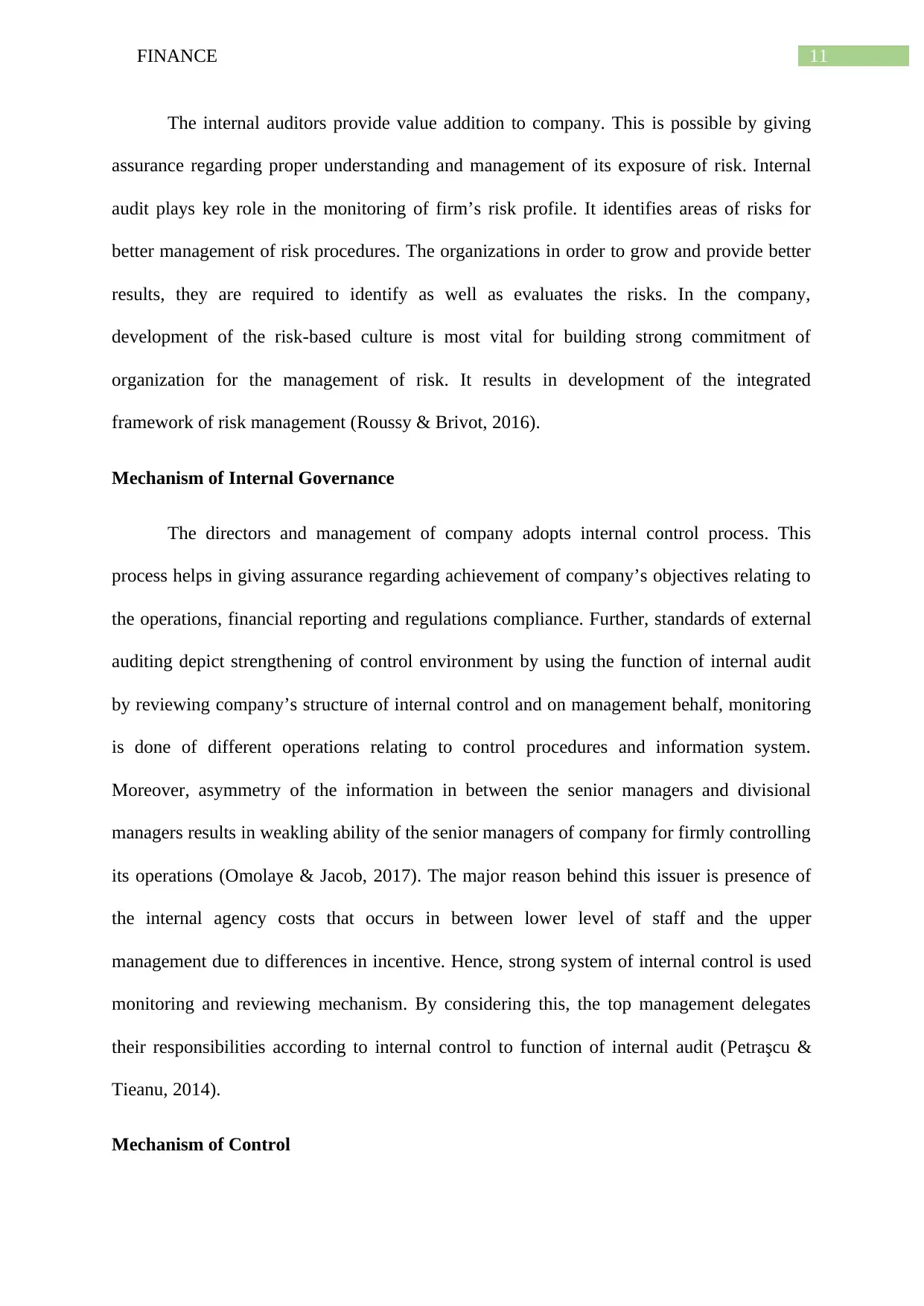
11FINANCE
The internal auditors provide value addition to company. This is possible by giving
assurance regarding proper understanding and management of its exposure of risk. Internal
audit plays key role in the monitoring of firm’s risk profile. It identifies areas of risks for
better management of risk procedures. The organizations in order to grow and provide better
results, they are required to identify as well as evaluates the risks. In the company,
development of the risk-based culture is most vital for building strong commitment of
organization for the management of risk. It results in development of the integrated
framework of risk management (Roussy & Brivot, 2016).
Mechanism of Internal Governance
The directors and management of company adopts internal control process. This
process helps in giving assurance regarding achievement of company’s objectives relating to
the operations, financial reporting and regulations compliance. Further, standards of external
auditing depict strengthening of control environment by using the function of internal audit
by reviewing company’s structure of internal control and on management behalf, monitoring
is done of different operations relating to control procedures and information system.
Moreover, asymmetry of the information in between the senior managers and divisional
managers results in weakling ability of the senior managers of company for firmly controlling
its operations (Omolaye & Jacob, 2017). The major reason behind this issuer is presence of
the internal agency costs that occurs in between lower level of staff and the upper
management due to differences in incentive. Hence, strong system of internal control is used
monitoring and reviewing mechanism. By considering this, the top management delegates
their responsibilities according to internal control to function of internal audit (Petraşcu &
Tieanu, 2014).
Mechanism of Control
The internal auditors provide value addition to company. This is possible by giving
assurance regarding proper understanding and management of its exposure of risk. Internal
audit plays key role in the monitoring of firm’s risk profile. It identifies areas of risks for
better management of risk procedures. The organizations in order to grow and provide better
results, they are required to identify as well as evaluates the risks. In the company,
development of the risk-based culture is most vital for building strong commitment of
organization for the management of risk. It results in development of the integrated
framework of risk management (Roussy & Brivot, 2016).
Mechanism of Internal Governance
The directors and management of company adopts internal control process. This
process helps in giving assurance regarding achievement of company’s objectives relating to
the operations, financial reporting and regulations compliance. Further, standards of external
auditing depict strengthening of control environment by using the function of internal audit
by reviewing company’s structure of internal control and on management behalf, monitoring
is done of different operations relating to control procedures and information system.
Moreover, asymmetry of the information in between the senior managers and divisional
managers results in weakling ability of the senior managers of company for firmly controlling
its operations (Omolaye & Jacob, 2017). The major reason behind this issuer is presence of
the internal agency costs that occurs in between lower level of staff and the upper
management due to differences in incentive. Hence, strong system of internal control is used
monitoring and reviewing mechanism. By considering this, the top management delegates
their responsibilities according to internal control to function of internal audit (Petraşcu &
Tieanu, 2014).
Mechanism of Control
⊘ This is a preview!⊘
Do you want full access?
Subscribe today to unlock all pages.

Trusted by 1+ million students worldwide
1 out of 22
Related Documents
Your All-in-One AI-Powered Toolkit for Academic Success.
+13062052269
info@desklib.com
Available 24*7 on WhatsApp / Email
![[object Object]](/_next/static/media/star-bottom.7253800d.svg)
Unlock your academic potential
Copyright © 2020–2026 A2Z Services. All Rights Reserved. Developed and managed by ZUCOL.





